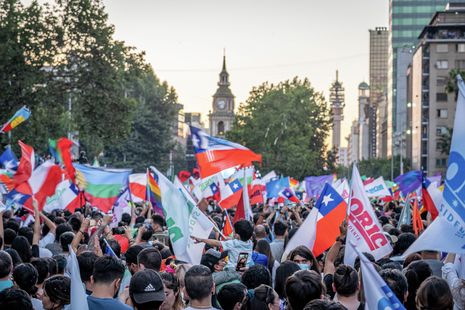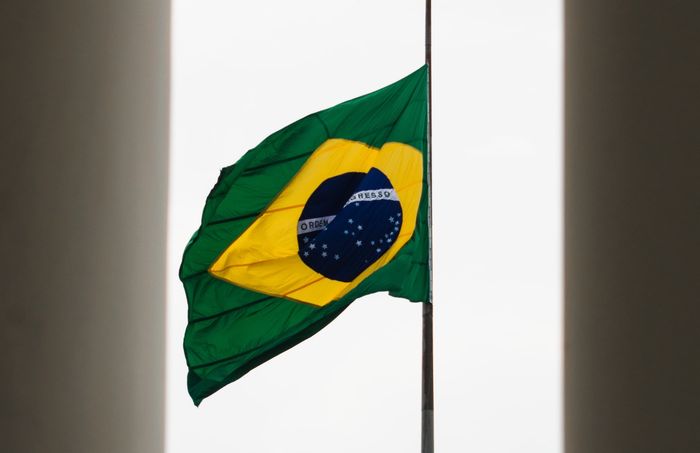Lessons from Chile: politics must be grounded in popular mobilisation
In the next instalment of his column, Eric Williams discusses the recent elections in Chile and details the upheaval of political life after the success of socialist candidate, Gabriel Boric

Gabriel Boric’s sweeping victory in the second round of Chile’s presidential election last month marks a historic moment for Latin America. As the culmination of a two-year-long wave of protests and civil unrest under the billionaire President Sebastian Pinera, the leftist’s triumph has underlined the power of popular mobilisation grounded in solidarity.
Although Boric is credited with the phrase “if Chile was the cradle of neoliberalism, it will also be its grave”, the saying grew to prominence as the rallying cry of the country’s protest movement, which began in October 2019. In reaction to increased Metro fares, a coordinated campaign by secondary school students to help passengers dodge turnstiles in Santiago developed into the largest social mobilisation in the nation’s history, with over a million taking to the streets against privatisation, high costs-of-living and inequality. It is this movement, emerging from the ground up, that has brought profound transformations to Chile’s political landscape, with the economic legacy of Pinochet and post-democratic transition years under serious threat.
“If Chile was the cradle of neoliberalism, it will also be its grave”
Almost five decades after the US-backed military coup against the democratically elected socialist President Salvador Allende, the country has become the most unequal in Latin America. The Pinochet regime’s fusion of authoritarianism and economic liberalisation enacted a policy set focusing on export-led growth, the dismantling of unions and all forms of popular organisation, coupled with the privatisation of social security and public assets. Whilst foreign capital and the nation’s wealthiest experienced massive benefits, deepening inequality saw working Chileans facing insecurity, with healthcare bills, expensive education fees, and the lack of adequate pensions and a functioning social safety net holding families under the constant threat of poverty. This has remained a permanent feature of Chile’s political economy since the transition to democracy in 1990. Last year, over fifty per cent of Chile’s employed population earned insufficient income to keep their families above the official poverty line. It is this tradition that the protest movement has challenged.
The very make-up of the Apruebo Dignidad coalition that brought Boric to power emphasises the novelty of the moment in Chilean politics. Apruebo Dignidad has united the oppositional left into a broad alliance including the powerful progressive Frente Amplio and the Communist Party, a merging of forces the type of which has not seen power since Allende’s Unidad Popular (UP). It is this kind of broad alliance amongst serious left-wing forces, fuelled by momentum from grassroots organisers, that has brought such a pivotal opportunity for change to Chile – epitomised in the Constitutional Convention. Granted as the Pinera administration’s attempt at pacifying the 2019 protests, the plebiscite on whether to redraft the Pinochet-era national constitution was forced into being by popular mobilisation.
If the solidarity-driven popular politics that brought Boric to power are embraced, the new constitution can bring profound improvements to millions of Chileans’ lives
The historic process was capitalised upon by the Chilean people; the approval of the Constitutional Convention by 78% of the vote last year, followed by the failure of the right-wing coalition to achieve the critical 1/3 of representatives to veto proposed laws, has left the potential for constitutionally enshrined social rights on issues that will affect the role of the state and the nation’s private property regime. An approach embracing external pressure from popular mobilization, accompanied by internal alliances between Frente Amplio, the Communist Party, indigenous representatives, and the independent left of feminist and environmentalist representatives may be able to pull the remaining votes needed from the centre-left to write ground-breaking socio-economic transformations permanently into the country’s constitution.
Whether Boric’s administration will harness the broad popular movements responsible for his victory once in power remains to be seen. In response to the threat of capital flight, Boric’s cabinet appointments last week, such as the governor of the central bank and former head of the World Bank’s Governance Global Practice, Mario Marcel, as Finance Minister, suggests that his administration plans to push for economic stability by reassuring investors. This is understandable and has precedent in previous left-wing Latin American pink tide governments, such as Lula’s cautious first term in early 2000s Brazil. Just as the marked presence of traditional centre-left and independent technocrats in his cabinet reflects the necessary compromises that come with a split Parliament, Marcel’s appointment indicates the power that capital holds over the Chilean economy. Given the constraints of a divided Congress and an economy where foreign outflows since the nationwide protests have accelerated to 9% of GDP, it would not be surprising if a path to social transformation were paved with trade-offs.
The crucial opportunity for major transformation lies in the constitutional convention, dominated by left-wing forces. If the solidarity-driven popular politics that brought Boric to power are embraced, the new constitution can bring profound improvements to millions of Chileans’ lives. However, the appointment of Antonia Urrejola as Foreign Minister, who worked for the US-dominated Organization of American States (OAS), which was implicated in contributing to the 2019 coup against Evo Morales in Bolivia, demonstrates a definite tendency to distance the new government from other existing projects in Latin America’s new pink tide. Uncertainty over the direction the new administration will take remains.
 Features / Should I stay or should I go? Cambridge students and alumni reflect on how their memories stay with them15 December 2025
Features / Should I stay or should I go? Cambridge students and alumni reflect on how their memories stay with them15 December 2025 News / Cambridge study finds students learn better with notes than AI13 December 2025
News / Cambridge study finds students learn better with notes than AI13 December 2025 Comment / The magic of an eight-week term15 December 2025
Comment / The magic of an eight-week term15 December 2025 News / News In Brief: Michaelmas marriages, monogamous mammals, and messaging manipulation15 December 2025
News / News In Brief: Michaelmas marriages, monogamous mammals, and messaging manipulation15 December 2025 News / Uni Scout and Guide Club affirms trans inclusion 12 December 2025
News / Uni Scout and Guide Club affirms trans inclusion 12 December 2025











